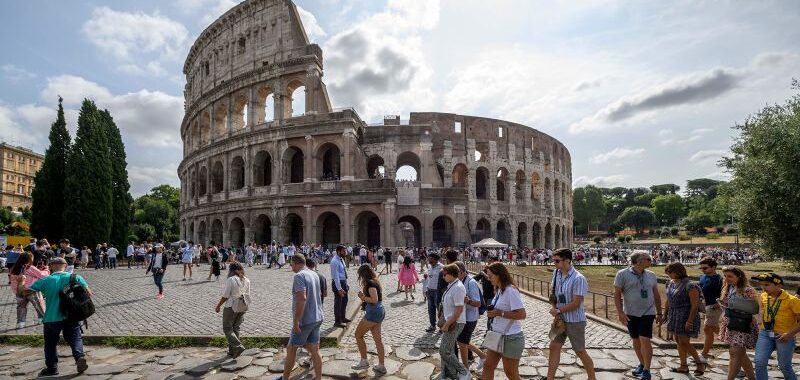For travel tips, recipes and more insight on Italian culture, sign up for CNN’s Unlocking Italy newsletter. This eight-part guide will have you packing your bags in no time.
The ancient Colosseum in Rome has witnessed some historic battles, with toga-clad crowds once packing the gigantic venue to watch gladiators slug it out against opponents including lions and baboons.
But, apparently, its fighting days aren’t over.
The 2,000-year-old venue is now the scene of a new epic clash — one that is emblematic of Italy’s current struggle to balance its surging post-Covid tourism industry with the needs of locals who feel under siege as their towns and cities become unlivable tourist playgrounds.
On one side of the arena is holiday rental giant Airbnb and the Colosseum Archaeological Park, which oversees the ruined structure, which is one of Rome’s most visited attractions.
The two organizations have signed a $1.5 million deal to offer 16 tourists a chance to “unleash their inner gladiator” by booking a free experience at the Colosseum as part of a tie-in to the newly released Paramount film “Gladiator II,” directed by Ridley Scott.
“You will feel the adrenaline rush, the sand between your fingers, and the weight of your armor. You will hear the echoes of gladiators past in the Colosseum’s catacombs and the unmistakable clank of steel in its arena. You will see the moon’s reflection off the travertine stone through the sweat dripping down your face. You will become a gladiator,” promises the AirBnB advertisement.
On the other side is Rome’s councilor for culture, Massimiliano Smeriglio. He has asked the rental platform to withdraw the plan, but leave the money, saying the promotion is an insult to the Colosseum’s historic stature.
“The issue is not the public-private relationship or the desire of big brands to support the protection and conservation,” Smeriglio said in a statement shared with CNN. “But to avoid a demeaning use of our historical-artistic heritage, especially when it comes to a monument that is unique in the world like the Colosseum.”
As part of the Airbnb promotion, announced this week, would-be gladiators can sign up on the short-term rental platform from November 27 for a chance to be one of 16 qualifying to take part in a “mock battle” against each other in full gladiatorial garb in May 2025. The experience is free, but winners will have to arrange their transportation and accommodation in the Eternal City.
Smeriglio isn’t alone in his opposition. The president of Rome’s Culture Commission, Erica Battaglia, has warned that the UNESCO heritage site cannot be turned into an amusement park.
“For what it represents, the Colosseum is a world heritage site and one must go to the direction to protect it, but also to make it accessible to all and to prevent it from becoming a place of pranks for a select few,” she said in a statement Friday.
The city of Rome, which will host millions of visitors for the Vatican’s declared Holy Jubilee Year 2025, has been struggling to find the balance between managing its cultural offerings and turning the city into what some decry as an amusement park.
The Trevi Fountain, which is undergoing a major renovation, will soon start limiting tourist access and may soon start selling tickets to visitors wanting to line up to throw their coins into its waters for luck.
‘We are not Disneyland’
Enzo Foschi, a politician for the center-left Democratic Party which currently controls Rome, criticized the Colosseum Archeological Park, which operates under the national cultural ministry, for agreeing to the Airbnb deal at a time when many Italian cities are struggling against overtourism.
“A publicity stunt by Airbnb which, after having effectively taken possession of the historic center, completely distorting it and turning it into a large tourist park, now wants to ridicule the Colosseum,” he said Friday. “We are not in Disneyland, we are in Rome. Every now and then someone seems to forget it.”
For its part, the Colosseum Archaeological Park has stood strong, insisting that the event will take place outside the Colosseum’s opening hours and will not interfere with access to the site.
Its management said in a statement that the plan is actually to “enhance the historical and cultural heritage of the amphitheater through immersive activities in full respect of the monument, based on rigorous historical research.” Airbnb, when asked, directed any questions to authorities in Rome.
“The collaboration aims to combine conservation, education and innovation to bring an increasingly wider audience closer to the cultural richness of the amphitheater,” the statement said. The $1.5 million would go to the conservation and ongoing restoration of the site, it added.
The controversial collaboration is also supported by Italian Prime Minister Giorgia Meloni’s party, Brothers of Italy. Federico Mollicone, a member of her party who heads the Lower House of Parliament’s Culture Commission said he applauds the innovative idea.
“The archaeological park of the Colosseum did well to sign a memorandum of understanding with the historical re-enactment associations also guaranteeing tourists a gladiator show of high scientific quality coordinated by ministry officials of Culture,” he said Friday in response to Smeriglio’s criticism.
“We reiterate our absolute favor for the agreement between public and private in culture, through partnerships or sponsorships, provided that they support initiatives that are of scientific and cultural value approved by the Ministry of Culture.”

